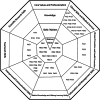Study on the construction of a Chinese cardiovascular physician competency model
- PMID: 40624062
- PMCID: PMC12234680
- DOI: 10.1038/s41598-025-09512-y
Study on the construction of a Chinese cardiovascular physician competency model
Abstract
Since the beginning of the 21st century, China's socioeconomic progress has altered lifestyles, accelerated urbanization, and population aging, significantly raising the risk of cardiovascular diseases (CVD). Currently, CVD stands as China's primary cause of death, necessitating the establishment of a high-quality cardiovascular workforce. While international research on competence models for cardiovascular physicians exists, the unique characteristics of Chinese CVD warrant a tailored approach. Despite numerous studies on competence models for clinical physicians in China, a model specific to cardiovascular physicians, aligned with the Chinese context, is lacking. This study aims to develop such a model to address CVD challenges and aid in recruitment, assessment, and training, aligning with the objectives of the "Healthy China 2030" plan. Utilizing a modified Delphi method, this study conducted two rounds of Delphi surveys involving 20 experts from renowned cardiovascular departments in Guangdong Province, China, based on literature reviews, behavioral event interviews, and expert consultations. Rigor and scientific validity were enhanced through measures such as experts' positive coefficient, experts' authority coefficient, and experts' coordination coefficient. Weightings for primary and secondary indicators were calculated using the Analytic Hierarchy Process and percentage weighting methods. The final cardiovascular physician competency model, tailored to the Chinese context, was determined. In both rounds of the Delphi surveys, the experts' positive coefficient exceeded 80%, the authority coefficient exceeded 0.7, and the p-values for the coordination coefficient were less than 0.01. These results indicate high accuracy and reliability, with strong expert consensus. The study developed a competency model comprising 8 primary indicators and 60 secondary indicators, with assigned weightings for each indicator. By utilizing an improved Delphi consensus process, the research team developed a competency model tailored to the Chinese context for cardiovascular physicians. This model encompasses various elements of clinical performance and professional behavior, and it is designed to provide effective guidance for the recruitment, evaluation, and residency training of cardiovascular physicians in China.
Keywords: Cardiovascular diseases (CVD); Cardiovascular physicians; Chinese context; Competency model; Delphi method.
© 2025. The Author(s).
Conflict of interest statement
Declarations. Competing interests: The authors declare no competing interests.
Figures
Similar articles
-
Construction of an ethical competency evaluation system for clinical physicians in China.BMC Med Educ. 2025 Jul 1;25(1):928. doi: 10.1186/s12909-025-07520-0. BMC Med Educ. 2025. PMID: 40598227 Free PMC article.
-
A Delphi-based framework for optimizing nurse staffing in Chinese hospitals.Front Public Health. 2025 Jul 4;13:1510931. doi: 10.3389/fpubh.2025.1510931. eCollection 2025. Front Public Health. 2025. PMID: 40687139 Free PMC article.
-
Hail Lifestyle Medicine consensus position statement as a medical specialty: Middle Eastern perspective.Front Public Health. 2025 Jun 20;13:1455871. doi: 10.3389/fpubh.2025.1455871. eCollection 2025. Front Public Health. 2025. PMID: 40620567 Free PMC article.
-
[Volume and health outcomes: evidence from systematic reviews and from evaluation of Italian hospital data].Epidemiol Prev. 2013 Mar-Jun;37(2-3 Suppl 2):1-100. Epidemiol Prev. 2013. PMID: 23851286 Italian.
-
Home treatment for mental health problems: a systematic review.Health Technol Assess. 2001;5(15):1-139. doi: 10.3310/hta5150. Health Technol Assess. 2001. PMID: 11532236
References
-
- Bi, Y. et al. Status of cardiovascular health in Chinese adults. J. Am. Coll. Cardiol.65, 1013–1025. 10.1016/j.jacc.2014.12.044 (2015). - PubMed
-
- McClelland, D. C. Testing for competence rather than for intelligence. Am. Psychol.28, 1 (1973). - PubMed
-
- Bass, T. A. et al. ACC/AHA/SCAI Advanced training statement on interventional cardiology (coronary, peripheral vascular, and structural heart interventions): A report of the ACC competency management committee. J. Am. Coll. Cardiol.81, 1386–1438. 10.1016/j.jacc.2022.11.002 (2023). - PubMed
MeSH terms
Grants and funding
LinkOut - more resources
Full Text Sources



